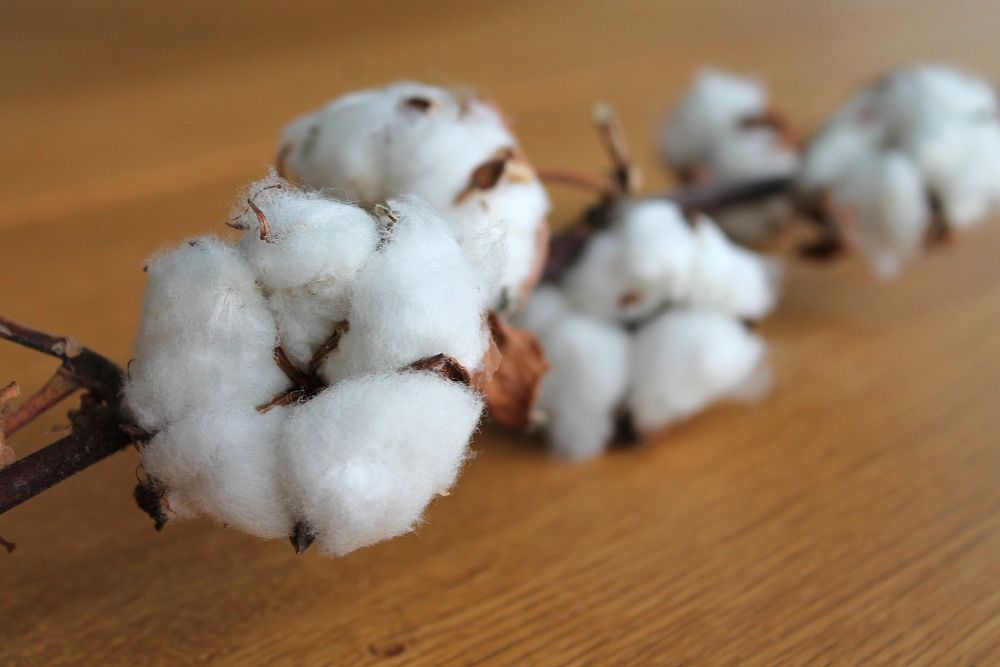
Thinking of buying organic cotton? You might want to know the benefits and disadvantages of this type of cotton. There are many pros and cons to organic cotton. factors to consider when making conscious choices for your wardrobe. This goes for organic cotton over conventional cotton. And for other eco-friendly fabrics such as bamboo, linen, hemp, lyocell.
Sustainability should not have to be labeled on clothing. Everything we consume should be sustainable. This is the ideal we at Panaprium are working towards. Making sustainability a priority without sacrificing great style and low price. If you are actively making an effort to be conscious of your fashion footprint, start with organic clothing.
Panaprium is independent and reader supported. If you buy something through our link, we may earn a commission. If you can, please support us on a monthly basis. It takes less than a minute to set up, and you will be making a big impact every single month. Thank you!
What is Organic Cotton?
To produce organic cotton, the seeds used are non GMO (genetically modified) and the cotton is grown without synthetic chemicals (pesticides and fertilizers). It does sounds a lot better than regular cotton. But surprisingly, there are still many disadvantages of this type of cotton.
Keep in mind that certified organic cotton provide more certainty than non certified organic cotton. It is a good idea to look for certifications when buying organic clothing generally (GOTS, OE100, Fair Wear, KBA,...).
So watch out for marketing tactics and the difference between how different countries grow their cotton. Conventional cotton production results in biodiversity losses, soil fertility reduction, health problems due to toxic chemicals from pesticides, herbicides, and insecticides.
White cotton represents 2.5% of the total agricultural area on Earth. But it uses 7% of all pesticides and 16% of all insecticides. These strong chemicals participate in the production of conventional cotton. They are subsequently released into the environment and have harmful effects on farmers' health and ecosystems.
On the environmental side, organic cotton is better than normal cotton. Organic cotton farming is less likely to contribute to acidification, eutrophication and global warming. Buying organic means helping with soil fertility and biodiversity. But it is not that simple. Organic cotton is better in some areas compared to regular cotton, but worse in others. Here are some of the pros and cons of organic cotton.

The Pros Of Organic Cotton (Benefits)
Organic cotton is significantly more environmentally friendly.
Less synthetic chemicals used overall. Less pesticides, nitrogen fertilizers.
Less synthetic chemical in freshwater sources and less water pollution.
Less air pollution.
Better dying, bleaching and overall production process.
Cleaner and more natural cotton seed.
Less soil contamination and better soil health.
Lower impact on wild life and their eco-systems.
Better crop diversity and less mono cultural crops.
Lesser health impact on workers. Fairer working conditions.
The Cons Of Organic Cotton (Disadvantages)
In some cases, organic cotton production uses more resources.
More land, water and energy used.
Lower yield, less efficient and less revenue.
Cannot keep up with the demand for it.
Higher greenhouse gas emissions sometimes.
More labor and time intensive.
Lack subsidies and protection.
Some harmful natural pesticides.
Very slow conversion and certification process.
More expensive to produce and sell.

Is Organic Cotton Better Than Regular Cotton?
The pros and cons of organic cotton are listed above in a general sense. Is buying organic always better? Yes in most cases. But the final verdict all depends on who you are buying from, where the cotton sourced and how it is grown (which country, which farm and supply chain). A lot depends on how it is produced overall.
The geographic location has a huge impact on cotton quality. The farm where the cotton is grown, the methods used to grow the cotton, how the cotton is produced play a major role. Organic cotton is a good purchase if the organic farming practices are good enough. The use of natural pesticides, fertilizers compared to synthetic chemicals, and the use of natural cotton seeds compared to GMO seeds.
Remember to look for certification such as GOTS Certified Organic Cotton when making a purchase decision. This way, you can expect from products quality, environmental and social sustainability.
The main environmental concern is water usage related to irrigation. In countries such as India, water is a rare resource because of scarcity. The most water-efficient option is rain-fed cotton, where cotton gets water from rainfall. But there is no way to know if the cotton we buy required additional water. Organic, all-natural is not always better. Many consider maximizing product per amount of inputs as the better solution.
At Panaprium, we believe that organic cotton benefits in using fewer chemicals are far too great to pass on. Organic is generally less harmful on the environment and the health of workers. Cotton is one of the most common fibers in the apparel industry. Before a cotton garment is sold, it must be dyed and finished. It is one of the dirtiest and most chemically intensive steps in making clothing. Life-threatening health problems for those who have been exposed repeatedly to toxic chemicals are unacceptable and have to be avoided completely. So let's buy Certified Organic.
Was this article helpful to you? Please tell us what you liked or didn't like in the comments below.
About the Author: Alex Assoune
What We're Up Against
Multinational corporations overproducing cheap products in the poorest countries.
Huge factories with sweatshop-like conditions underpaying workers.
Media conglomerates promoting unethical, unsustainable products.
Bad actors encouraging overconsumption through oblivious behavior.
- - - -
Thankfully, we've got our supporters, including you.
Panaprium is funded by readers like you who want to join us in our mission to make the world entirely sustainable.
If you can, please support us on a monthly basis. It takes less than a minute to set up, and you will be making a big impact every single month. Thank you.































0 comments